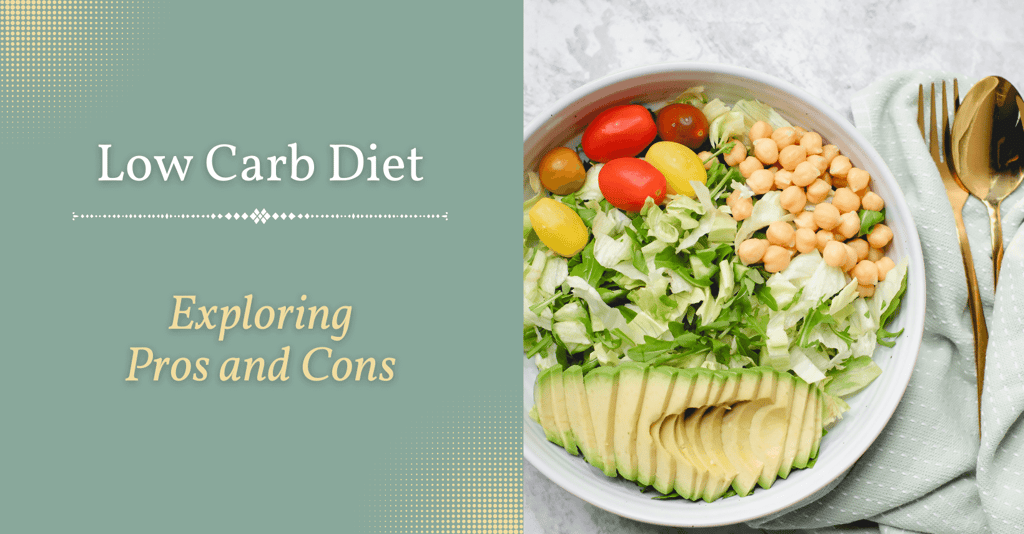Add your promotional text...
Is a Low Carb Diet Right for You? Exploring the Pros and Cons
8/26/20233 min read


Diets are a popular topic, and one that gets a lot of attention is the "low carb diet." It's a way of eating with good and not-so-good sides, and it doesn't work the same for everyone. Let's take a closer look at low carb diets and see if they might be right for you.
What is a Low Carb Diet?
A low carb diet is a specific way of eating that focuses on reducing your intake of foods high in carbohydrates, such as bread, pasta, and sugary items. Instead, it emphasizes a higher consumption of proteins, healthy fats, and non-starchy vegetables. The primary goal is to encourage your body to use stored fat for energy rather than relying on carbohydrates, which can lead to potential benefits like weight loss and improved blood sugar control.
Different Bodies, Different Needs
Our bodies are unique, and how we react to different diets can vary. While some people find low carb diets work well for them, others may not experience the same benefits. Metabolism plays a vital role, with some individuals burning calories faster than others. For those who engage in regular exercise, low carb diets may not provide the necessary energy. Additionally, individuals with specific health concerns should consider alternative dietary approaches.
Making an Informed Decision
Before you decide on a dietary path, it's important to explore the pros and cons of low carb diets to determine if they're the right choice for you.
The Pros of a Low Carb Diet:
Effective Weight Management: A low carb diet can be good if you want to lose weight. When you eat fewer carbs, your body starts using the extra fat you have stored as energy. This can help you shed those extra pounds, especially when you also eat less overall.
Keeps Blood Sugar Stable: If you have diabetes, a low carb diet can be a friend. It helps keep your blood sugar levels steady, which is super important for your health.
May Lower Heart Problems: Some studies suggest that a low carb diet could reduce the chances of having heart problems. It's all about eating healthier fats and fewer carbs, which can be good for your heart, especially if you're living a healthy lifestyle.
The Cons of a Low Carb Diet
Not for Everyone: Some folks might not feel so great on a low carb diet. Our bodies work differently, and not everyone reacts the same way. If you're someone who does a lot of exercise or has health issues, a low carb diet might not be the best pick for you.
Your Body Needs Carbs: Carbohydrates are like the fuel that keeps your body going. When you're doing tough workouts, your body needs carbs to give you energy. And your brain, which controls everything, also needs carbs to work well. If you don't get enough carbs, you could end up feeling tired, moody, and unable to focus.
Risk of Missing Important Nutrients: Low carb diets can sometimes mean you miss out on important nutrients, vitamins, and stuff that's good for your digestion. That's not so great for your overall health.
Finding the Right Balance
To succeed with a low carb diet, find balance. You don't have to eliminate carbs entirely. Carbs fuel your body, especially during intense workouts, and your brain relies on them for optimal function. Striking a balance means adding healthy carbs from whole grains, fruits, and veggies to your diet. These foods provide crucial nutrients for overall health, supporting digestion and ensuring your body functions properly.
Getting Expert Advice
Before making any significant dietary changes, consult healthcare professionals or diet experts. They will assess your health, activity levels, and goals, providing tailored dietary recommendations to help you achieve your health and wellness objectives.
If you have any questions or need some assistance, feel free to submit a comment or send us a message here.
In Conclusion
Before you start lifting weights, it’s essential to prioritize your pre-workout routine. By avoiding these common pitfalls and considering your primary fitness goals, you can improve your workout performance, reduce the risk of injury, and achieve better results in the gym. Remember to warm up, stay hydrated, eat wisely, and maintain a positive mindset. With these habits in place, you’ll be well on your way to a safer and more effective weightlifting experience.
